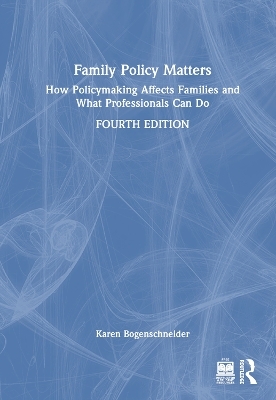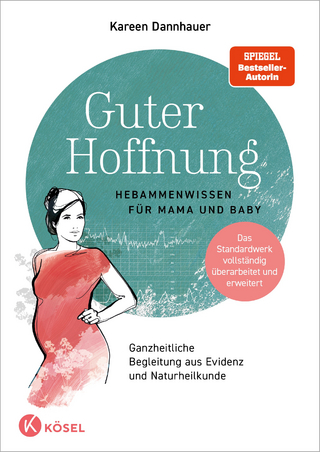
Family Policy Matters
Routledge (Verlag)
978-1-032-31833-2 (ISBN)
Beyond the basics, the book provides best practices for turning analysis into action by drawing on cutting-edge research and a point of view often overlooked in policy books—the voice of policymakers themselves. Imbued with hope yet fundamentally realistic, Bogenschneider applies a relationship-based and strikingly nonpartisan approach for those who want to make a positive difference for families, whether they engage local policymakers in towns, cities and counties; state/national lawmakers; or decision-makers in businesses, nonprofits and philanthropy.
Accompanied by updated, web-based teaching materials and a family impact toolkit, this is core reading for undergraduate and/or graduate courses in family or social policy taught in human development and family studies, psychology, counseling, social work, sociology, public policy, political science, and education. It is also essential reading for professionals and policymakers interested in pursuing better public policy for families in all their diversity across the lifespan.
Karen Bogenschneider is a Rothermel-Bascom Professor Emeritus of Human Ecology at the University of Wisconsin–Madison. She is widely recognized in the United States and abroad for her expertise in evidence-based family policy—studying it, teaching it, and doing it.
Part 1: Why You Should Care About Family Policy. 1. If You Want to Make a Difference, You Should Care About Family Policy. 2. Why We Should Focus on Families in Policymaking, and Why We Don’t. 3. Why Do We Need Family Policy? A Global Rationale. Part 2: The Basics of Family Policy and the Policymaking Process. 4. To Become a Field of its Own, Family Policy Needs Fresh Definitions. 5. What are Family Policies Anyway? Who Makes Them and Who Shapes Them? 6. What Policymakers and the Policy Process are Really Like. Part 3: What Forces Influences the Formation of Family Policy. 7. How Much are Families Changing? Have Policies Kept Pace? 8. How Individualism is Woven into our Families, our Work and Play, and our Policies. 9. How the Economy Influences Families and How Families Influence the Economy. 10. Why Polarization Influences Family Policy and How to Bridge the Divide: Guidance from the Theory of Paradox. Part 4: How Professionals Can Make Families Matter in Policymaking. 11. A Toolkit for Infusing the Family Impact Lens into Policy, Programs, and Practice. 12. What Insights From the Past Can Guide Family Policy in the Future? 13. How to Engage Policymakers in Family Policy: Best Practices From Theory, Research, and the Family Impact Seminars. 14. How to Approach Policymakers: The Critical Choice of Advocacy or Education. 15. Go Forth With Hope to Make Families Matter in Policymaking.
| Erscheinungsdatum | 27.02.2024 |
|---|---|
| Zusatzinfo | 44 Tables, color; 10 Line drawings, black and white; 1 Halftones, color; 2 Illustrations, color; 9 Illustrations, black and white |
| Verlagsort | London |
| Sprache | englisch |
| Maße | 178 x 254 mm |
| Gewicht | 453 g |
| Themenwelt | Sachbuch/Ratgeber ► Gesundheit / Leben / Psychologie ► Schwangerschaft / Geburt |
| Geisteswissenschaften ► Psychologie ► Allgemeine Psychologie | |
| Geisteswissenschaften ► Psychologie ► Entwicklungspsychologie | |
| Sozialwissenschaften ► Pädagogik ► Sozialpädagogik | |
| Sozialwissenschaften ► Soziologie ► Mikrosoziologie | |
| ISBN-10 | 1-032-31833-3 / 1032318333 |
| ISBN-13 | 978-1-032-31833-2 / 9781032318332 |
| Zustand | Neuware |
| Informationen gemäß Produktsicherheitsverordnung (GPSR) | |
| Haben Sie eine Frage zum Produkt? |
aus dem Bereich


